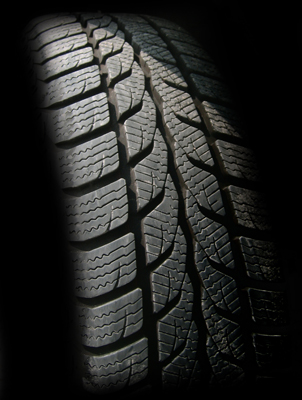What Is The Difference Between Asymmetric, Symmetric, and Directional Tire Treads?
November 25, 2016

Are your tires too worn to keep you and your vehicle safe on the road this season? You may be shopping for a new set of winter or all-season tires, and wondering what the difference is between asymmetric, symmetric, and directional tire treads.
Each kind of tire tread has a different driving benefit, so the kind of tread you choose depends on your typical winter driving conditions. In this post, we’ll explain the differences between directional, asymmetric, and symmetric tire treads and what each one means for you and your vehicle.
Directional Tire Treads
If your tire is directional, you’ll know by the arrow on the sidewall. This arrow indicates which way the tire is supposed to roll. Because directional tires are built to only roll in one direction, you can only rotate your tires back-to-front (and not side-to-side).
The tread of a directional tire is constructed in a V-shaped pattern and features wide grooves between the tread blocks. These grooves help prevent hydroplaning at higher speeds by allowing water to move quickly through the tread.
People often choose directional tires for their vehicles if they intend to drive in wet conditions. Directional tires also can offer improved traction in snow, depending on the design. Summer, all-season, and winter tires can all have a directional tread design, but all-season tires are the most likely to have this tread pattern. If you live in an area that gets a moderate amount of snow mixed with rain in the winter, this tread pattern may be the best choice for your vehicle.
Asymmetric Tire Treads
Asymmetric tire treads combine different tread patterns to create maximum grip in a variety of weather conditions. Although you can rotate asymmetric tread tires in multiple patterns, the sidewall will indicate which side of the tire should be facing outside. This is because of the construction of the tire—the inside and middle of the tread are usually designed for snow or slush traction, and the outside features larger tread blocks to maintain grip and control on dry, clear roads. This creates an asymmetric tread pattern with different tread zones across the tire.
If you often drive in snowy and slushy conditions during the winter, an asymmetric tire tread is likely your best and safest choice. It offers performance and protection in all sorts of weather conditions you may encounter during a Canadian winter.
Symmetric Tire Treads
Symmetric tires are a common choice among those looking for an economic, long-lasting tire. They can be rotated any number of ways because the tread has the same pattern across the whole tire, with equally sized and continuous grooves.
Although they’re a good choice for dry summers, symmetric tire treads generally don’t offer much in terms of winter performance. If you use a symmetric tire in the winter, you’re much more likely to run the risk of completely losing traction or control of your vehicle.
Combination Tire Treads
Some higher performance winter tires combine both directional and asymmetrical treads. These tires feature both a V-shaped tread pattern which directs water away from the tire and the enhanced traction of an asymmetrical tire. These tires, like regular directional tread tires, can only be mounted certain ways as the tire can only roll forward in one direction.
There’s More To Choosing The Best Winter Tire
Tire tread design is just one factor you should consider when searching for the best winter tire for your vehicle. To learn more about what you should know when looking for a winter tire, click here to download our Ultimate Guide to Winter Tires!
TIRECRAFT proudly carries directional, symmetric, and asymmetric tread tires from the world’s top tire manufacturers. If you need new tires ahead of the winter season, click here to find the TIRECRAFT dealer nearest you.
Back

